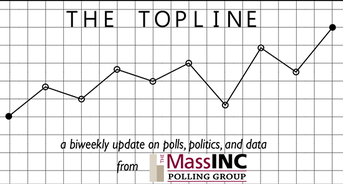
During his 1990 campaign, Massachusetts Governor Bill  Weld famously declared he would “reintroduce prisoners to the joys of busting rocks”. That tough-on-crime stance was in keeping with the times. But now, Massachusetts voters are the ones ready to break new ground, calling for major shifts in the state’s criminal justice system. Most would like the system to emphasize prevention and rehabilitation; instead voters see the current system as focusing more on punishment, and making ex-inmates more likely to reoffend.
Weld famously declared he would “reintroduce prisoners to the joys of busting rocks”. That tough-on-crime stance was in keeping with the times. But now, Massachusetts voters are the ones ready to break new ground, calling for major shifts in the state’s criminal justice system. Most would like the system to emphasize prevention and rehabilitation; instead voters see the current system as focusing more on punishment, and making ex-inmates more likely to reoffend.
When Weld originally promised to make prison harsh and bleak, the nation was in the grips of a crime wave, and states were responding with long mandatory sentences for a variety of offenses. Just two years removed from the Willie Horton ad that some say helped sink Michael Dukakis’s presidential bid, Weld’s stance was politically smart.
But good politics don’t always make for good policy. The public has seen the impact of the tough-on-crime era, and the tide of opinion has since turned. With those long mandatory sentences came a swelling prison populations, and corrections budgets soared. Even so, the policy shifts did little to prevent former inmates from reoffending when they got out. Massachusetts has seen its incarceration rate more than triple since 1980.
A generation later, many states are adopting a new approach the focuses more preventing crime, rehabilitating criminals so they don’t reoffend when released, and sending drug offenders to treatment instead of prison. Even the old prosecutor Weld now favors of the new approach; in 2015, he spoke in favor of diverting drug criminals to treatment at a reform rally on the National Mall.
A new MassINC poll out today shows Massachusetts voters are ready to implement similar reforms to what other states are doing (crosstabs). At every stage of the criminal justice system, from the “front end” where criminals are sentenced for crimes to the “back end” when they are released back into society, voters see room for improvement. That’s noteworthy because the leading legislation being considered on Beacon Hill focus mostly on the back end of the system, when ex-inmates are released. It does little to address the way they are sentenced.
Other key figures from the poll:
- 62% support sealing misdemeanor records after 3 years instead of 5-year wait.
- 65% support sealing a felony record after 7 years, instead of the current 10-year wait.
- 60% support raising the felony theft threshold from $250 to $1,500 so that petty theft does not result in a long-lasting criminal record
- 50% think people should not be responsible for supervision and court fees if they do not earn enough money to afford the payments.
- Just 8% say mandatory minimums are preferable to other sentencing policies
Opinion on this extends beyond liberal drum circles. Democrats, Republicans, and independent voters all want major changes to the criminal justice system, and support a variety of reforms. Democrats are more enthusiastic than others on certain issues, but majorities of all 3 groups support most of the reforms we tested. Nearly every issue splits along party lines these days, but on criminal justice there is room for common ground. Indeed, in other states, Republicans have led the way on criminal justice reform, looking for way to save money.
MPG ICYMI
The MassINC Polling Group and WBUR have renewed our partnership through June 2018. This continues the longest and most successful media polling relationship in Massachusetts. There will be a lot to do. We will be tracking public opinion on key policy issues and preparing for some major elections. It appears 2018 could be a blockbuster year in Massachusetts politics, with Senator Warren and Governor Baker facing reelection, and several potentially contentious ballot questions for voters to decide. Thanks to WBUR and their listeners; without their support, none of this would be possible.
Speaking of ballot questions, the 2016 election saw the defeat of Question 2, which would have lifted the state’s cap on charter schools. Representatives from both sides of the issue came together last Thursday to discuss takeaways in terms of communications and messaging. Steve Koczela talked about how public opinion shifted from strong support for the question early to a bigger-than-predicted loss.
The Crosstabs
President Donald Trump’s approval rating remains historically low.
Politico ran its fourth annual survey of the White House press corps. “While 68 percent of them think Trump is the most openly anti-press president in U.S. history, 75 percent said they see Trump’s attacks against the media as more of a distraction than a threat.”
Quinnipiac finds the “generic ballot” (pollster-speak for which party’s candidate you would support for Congress) is leaning to the left by an eye-popping 16-point margin. Most polls show a preference for Democrats on this question, but with narrower margins. Our advice? Check back in a while.
PRRI and the Atlantic find cultural anxiety and partisan identity among the white working class drove more votes to Trump than the much-discussed economic anxiety.
Voters have not warmed to Trumpcare (or whatever we’re supposed to call it) – a new HuffPost/YouGov poll finds.
A Politico/Morning Consult poll finds voters tilted against the provision that allows states to opt-out of requiring insurance companies to cover pre-existing conditions.
The politics of repealing and replacing the ACA were already thorny, and are still getting harder. Following the vote, the Cook Political Report shifted their prognostications for 20 congressional districts to categories more favorable to the Democrats
